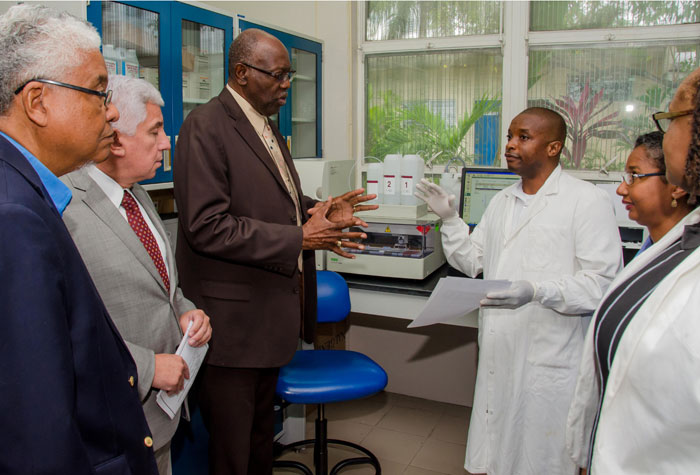Government Acquires Machine for Sickle Cell Screening
By: , March 12, 2015The Key Point:
The Facts
- The Pan American Health Organization (PAHO), on March 11, officially handed over the machine to the Sickle Cell Unit, located at the Tropical Medical Research Institute on the grounds at the University of the West Indies.
- The unit, for the screening of newborns for sickle cell disease, was acquired under a US$200,000 technical cooperation project between Brazil and Jamaica. It is already being used at the Sickle Cell Unit.
The Full Story
Government’s effort to reduce deaths due to sickle cell disease has been boosted through the acquisition of a High Performance Liquid Chromatography (HPLC) machine.
The Pan American Health Organization (PAHO), on March 11, officially handed over the machine to the Sickle Cell Unit, located at the Tropical Medical Research Institute on the grounds at the University of the West Indies.
The unit, for the screening of newborns for sickle cell disease, was acquired under a US$200,000 technical cooperation project between Brazil and Jamaica. It is already being used at the Sickle Cell Unit.
Minister of Health, Hon. Dr. Fenton Ferguson, noted that the acquisition of the machine will assist Jamaica in achieving the Millennium Development Goal of reducing child mortality.
“That is important as right now in 2015, Jamaica is still lagging behind. We recognise that this machine will help in early detection, diagnosis and treatment and will make a big difference in the outcomes relative to sickle cell,” Dr. Ferguson said.
The HPLC machine is one of many deliverables under the agreement between Brazil and Jamaica.
Other activities include a study tour of the Brazilian sickle cell services and the training of medical personnel by Brazilian specialists in neonatal screening and sickle cell disease management.
In her remarks, PAHO/World Health Organization (WHO) Representative to Jamaica, Dr. Noreen Jack, said early detection through screening is critical in the treatment of sickle cell disease.
Sickle-cell disease or sickle-cell anaemia is a recessive genetic blood disorder, which comes as a result of inheriting abnormal haemoglobin genes from both parents. It is characterised by the red blood cells assuming an abnormal, rigid, sickle shape.
Sickling decreases the flexibility of cells, blocking blood flow in the blood vessels in the limbs and organs, which can cause pain, serious infections, and organ damage.
Sickle cell is a major genetic disease in most countries in Sub-Saharan Africa and to a lesser extent in other parts of the world.
It is estimated that 1.8 in every 1000 persons in the Jamaican population has sickle cell disease.
Statistics from the WHO indicate that approximately five percent of the world’s population carries the trait genes for sickle cell disease.

